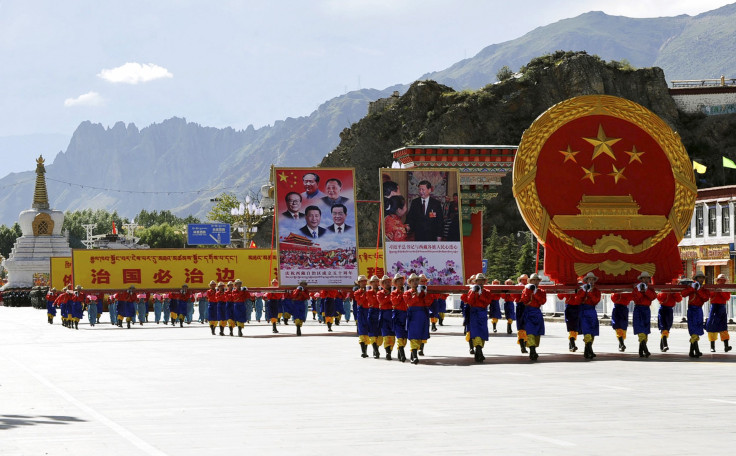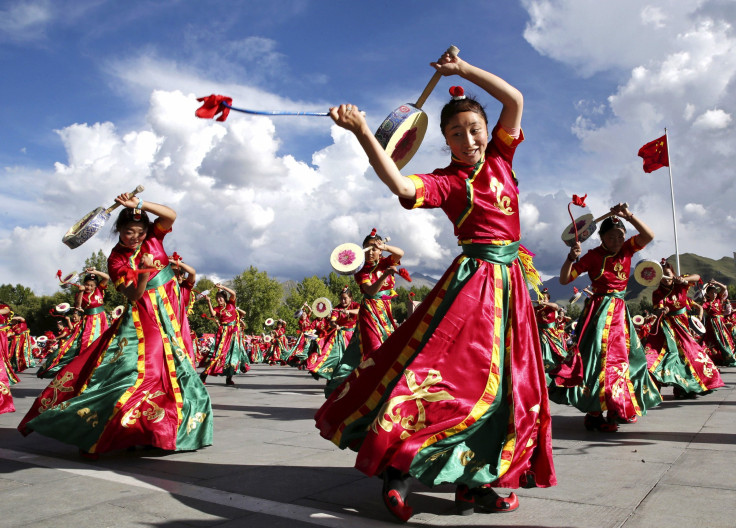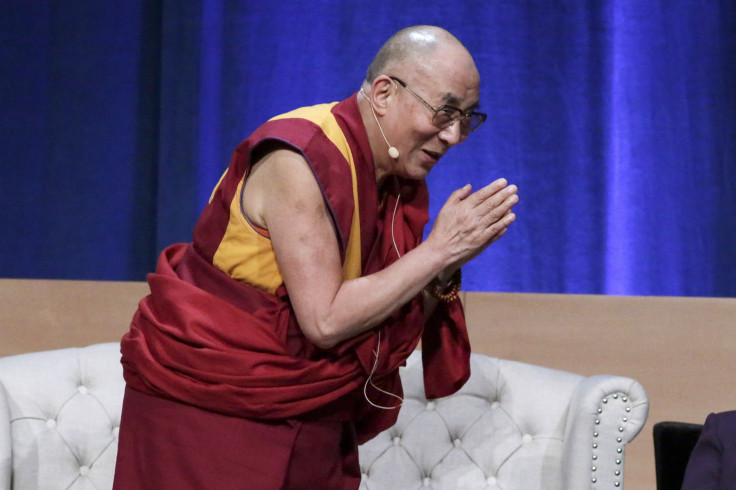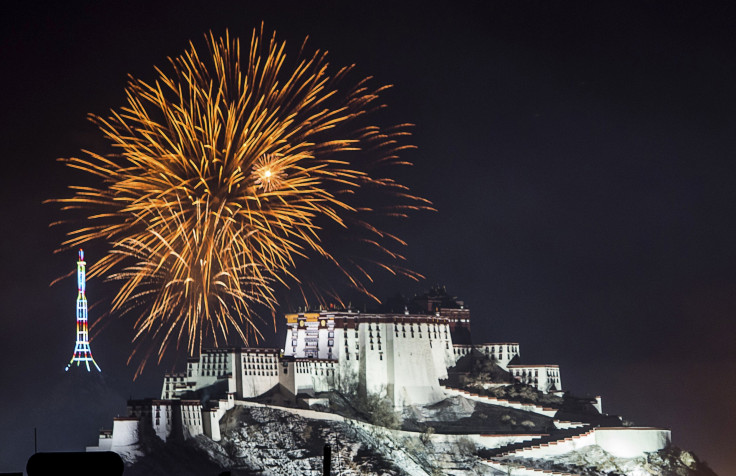China Celebrates Fiftieth Anniversary Of Tibet Autonomous Region, Vows To Step Up Fight Against Dalai Lama

SHANGHAI -- China held a mass ceremony in the Tibetan capital Lhasa to mark the fiftieth anniversary of the founding of the Tibet Autonomous Region (TAR). State television showed officials who addressed the invited audience pledging to defeat what they said were repeated attempts by the exiled Tibetan spiritual leader, the Dalai Lama, to split Tibet from China.
On a specially erected stage in a square beneath the Dalai Lama’s former residence, the Potala Palace, Chinese politburo member Yu Zhengsheng praised the creation of what he called a “vibrant socialist new Tibet” since the TAR was founded in 1965, six years after the Dalai Lama, traditionally revered by Tibetans as a God-king, fled into exile in India after a failed uprising against Chinese rule.
The ceremony, which was followed by a parade through the city, comes against a backdrop of tension in Tibet, with more than a hundred Tibetan Buddhist monks and ordinary citizens reported to have set themselves on fire over the past few years, in protest at Chinese rule and what they say are restrictions on their culture and religion, including the imposition of political study sessions in monasteries.

However, Yu Zhengsheng told an invited audience consisting of several thousand people in traditional Tibetan dress, and a large number of soldiers -- but apparently few monks -- that Tibet had been transformed from a backward society over the past half century. He stressed that GDP had grown 68-fold during that period, and said that freedom of religious belief in the mainly Buddhist region had “been fully respected and protected in Tibet over the past 50 years,” state media reported. He did not make any reference to the Cultural Revolution of the 1960s and 1970s, when historians say monasteries were closed -- and some of them damaged or destroyed -- and monks jailed, nor to what overseas human rights groups say are restrictions on the practice and teaching of Buddhism in contemporary Tibet.
But Yu did touch on current tensions, referring to an ongoing “struggle against separatism … and foreign hostile forces' splittist and sabotage activities." State media also reported that he had earlier urged Tibet's army, police and judiciary to be ready to "fight a protracted battle against the clique of the 14th Dalai Lama."
In an apparent attempt to appease criticisms, Yu said that "religious affairs should be managed according to law” and problems should be addressed through "legal thinking and judicial means.” But he made it clear who was in charge, saying that “only by sticking to the Communist Party’s leadership” and the current administrative arrangements could Tibetans "be their own master.”
The ceremony, which follows the publication of a new white paper on Tibet, setting out government plans to modernize the region’s economy, comes amid renewed tension between Beijing and the Dalai Lama. China has refused to hold talks with the exiled Tibetan spiritual leader, who says he does not seek independence from China, but only “true autonomy.” However, Beijing has accused him of being a separatist -- and official Chinese media have stepped up their criticisms of him: on Monday the official Global Times newspaper accused him of failing to call on monks to stop self-immolations.

And on Tuesday it said that while the West “lauded him as a saint,” and saw him as a “smiling and wise old man,” he was actually a “cruel ruler in exile” with a “shadowy past” -- though it did not give specific details to back up these accusations.
The Global Times also accused the Dalai Lama and his followers of being “an appendage to external forces to destabilize Tibet,” and said that Western media and governments had created an “imaginary Tibet,” which it described as “the longest lasting lie in the modern world.” It argued, however, that “as China gradually moves to the center of the world stage, people across the world will have the chance to see the real Tibet,” and said the “Dalai Lama clique is bound to be the loser" in the end. It also suggested that compared to native Americans in the U.S., Tibetans “have kept their originality more.”
China has been particularly angered by the Dalai Lama's recent comment that, given his dissatisfaction with the current situation in Tibet, he may choose not to be reincarnated when he dies. Beijing says only Tibetan monks inside China can identify the Dalai Lama's successor, and sees his comment as an attempt to undermine its control of Tibetan affairs. China's official news agency recently quoted Tibetan religious experts as saying that the Tibetan spiritual leader had no right not to be reincarnated.

Tension over the issue is linked to the controversy over the selection of a new Panchen Lama, Tibet’s second-most powerful religious figure, two decades ago. China selected its own Panchen Lama, while a boy nominated by the Dalai Lama was taken away by the authorities and has not been seen in public since. Chinese officials said at the weekend that the Dalai Lama's candidate was not under arrest, but was being "well educated." They said his whereabouts had to be kept secret for his own protection from foreign forces seeking to exploit him, adding that “he is forced to hide until he is no longer seen as a political card.’
The London based Free Tibet movement, meanwhile, accused China of restricting Tibetans' freedom of movement, and trying to make its own definition of Tibetan identity.
© Copyright IBTimes 2024. All rights reserved.












